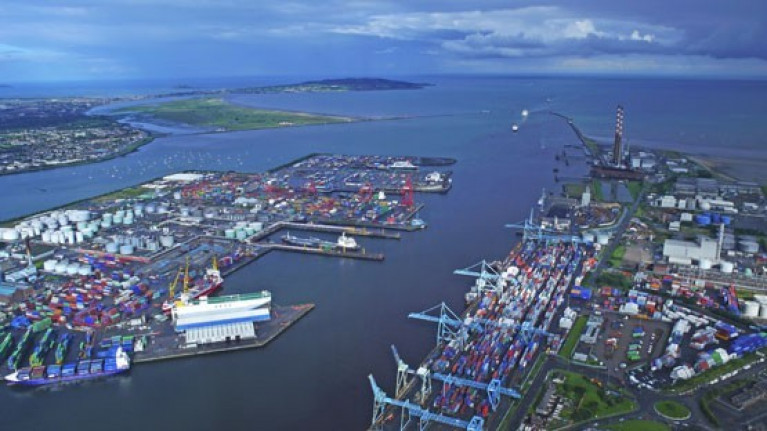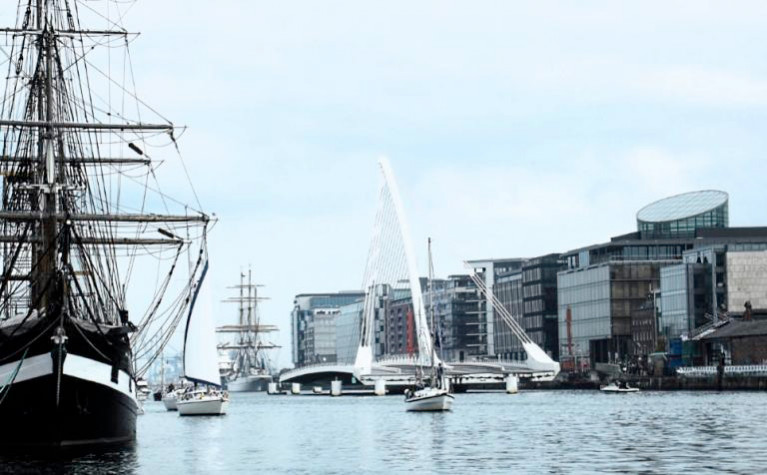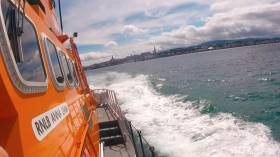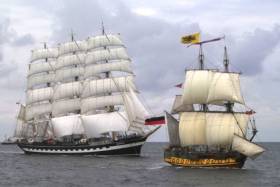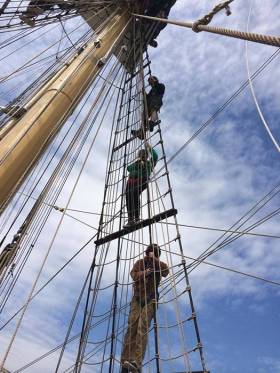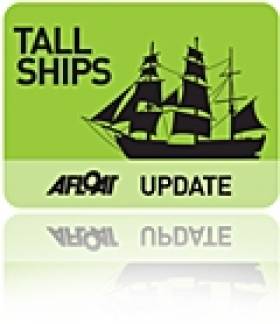Displaying items by tag: Dublin Port Riverfest
Two men who were jailed earlier this year for drunkenly sailing their boat up the River Liffey from Dublin Port will have a hearing of their appeal to overturn the verdict and sentences next April, as TheJournal.ie reports.
Boat owner Brian Stacey (46) and Ronan Stephens (43), both from Crumlin, were each sentenced to three months in prison with the final month suspended over the incident on 1 June 2017.
Afloat.ie previously reported on the early morning chase up the River Liffey from the port to Sir John Rogerson’s Quay.
The court heard that the skipper’s erratic driving of the 26ft quarter tonner Peja delayed the entry of the 4,000-tonne cruise liner Corinthian into the port.
It was also heard that Stephens was arrested after he made landfall at the city quays and stripped off his clothes, and told gardaí he had a “God-given right to operate on the water”.
TheJournal.ie has more on the story HERE.
Yachtsman Found Guilty Of Sailing While Drunk In Dublin Port Incident
The captain of a small sailing boat has been found guilty of operating a vessel while intoxicated, among a number of charges over an incident during the Dublin Port Riverfest in 2017.
Boat owner Brian Stacey (46) and Ronan Stephens (42), both from Crumlin, went on trial last summer over the incident on 1 June 2017 that prompted an early morning chase up the River Liffey from Dublin Port to Sir John Rogerson’s Quay.
The court heard that the skipper’s erratic driving of the 26ft quarter tonner Peja delayed the entry of the 4,000-tonne cruise liner Corinthian into the port.
Stephens was arrested after he made landfall at the city quays and stripped off his clothes, it was heard.
And the court also heard Stacey say it was his “God-given right to operate on the water” as he and his co-accused denied all charges, insisting there was no alcohol on their vessel.
Both will be sentenced next week. RTÉ News has much more on the story HERE.
A small sailing boat that was “erratically” zigzagging in the shipping lane delayed a cruise liner from entering Dublin Port, as the Irish Independent reports from a Dublin court.
The trial of two Crumlin men facing charges under the Maritime Safety Act and the Public Order Act is currently before Dublin District Court, following the incident on 1 June 2017 ahead of that year’s Dublin Port Riverfest.
As previously reported on Afloat.ie, Brian Stacey and Ronan Stephens were charged over the incident that prompted an early-morning chase up the River Liffey as far as Sir John Rogerson’s Quay.
It’s also claimed that the activity delayed the entry of the 4,000-tonne cruise liner Corinthian into the port.
The trial continues on Tuesday 18 June. Independent.ie has much more on the story HERE.
Dublin Port Riverfest Tall Ships to be Nautical Highlight of Crowded Bank Holiday Weekend
For anyone interested in boats and the sea, the June Bank Holiday Weekend is always busy with multiple maritime happenings, many of which will be of interest to all the family writes W M Nixon. But if sailing is specifically your thing, the variety of options available is almost bewildering. Owing to some trick of this year’s calendar, events which would normally be held a week hence are being pushed into this already crammed holiday schedule, yet it will somehow all be managed in the end.
However, if you want to focus on just one event which best gets the spirit of it all, the Dublin Port Riverfest from Saturday 3rd to Monday 5th June on our beloved River Liffey and its many quaysides promises to have something for everyone. There’ll be Tall Ships in port after arriving today, and while their numbers won’t match the huge fleets which follow the official Sail Training International programme, there’ll be more than enough to interest genuine enthusiasts, with all the vessels open to the public for free (tide permitting) between noon and 6.0pm on each of the three days.
Included in those visiting is the legendary Russian vessel Shtandard, a replica of a warship of Peter the Great from 1703. While her size in no way matches that of the Russian 4,000 ton square rigger Kruzenshtern, those who are thinking in terms of an Irish sail traning ship in the fullness of time will note that the manageably-sized Shtandart – which is coming to Ireland fresh from a starring role at the Festival of Sail in the Morbihan in France – is in superb order, a real ambassador for Russia, whereas the giant Kruzenshtern is becoming unmanageably large to keep in proper commission.
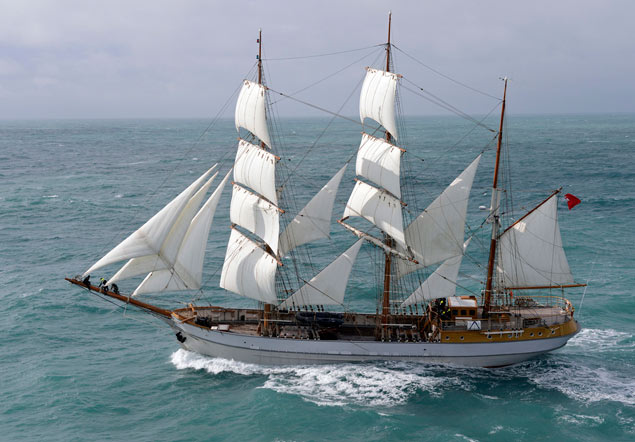 The clean-lined square rigger Kaskelot will be in Dublin for the holiday weekend
The clean-lined square rigger Kaskelot will be in Dublin for the holiday weekend
Other noted square-riggers in port, as Afloat.ie reported earlier, will include Kaskelot, the Earl of Pembroke, and the Pelican. But past experience has shown that the modern pubic seeks much more variety than just an endless round of queuing to get aboard a tall ship. So the river itself is going to be used for a continuous show of powerboats racing and a colourful variety of waterborne stunts and competitions in order to keep the expected crowd of 100,000 over the three days well entertained.
However, if it’s sailing you seek in the midst of all this, Poolbeg Yacht & Boat Club’s marina at Ringsend is the focal point for a three day regatta which will include Old Gaffers racing, while on Saturday evening down at the end of the South Bull Wall, boats competing in the Irish Sea Offshore Racing Association’s version of the Lambay Race will be finishing their race at a line specially provided by Poolbeg Y&BC.
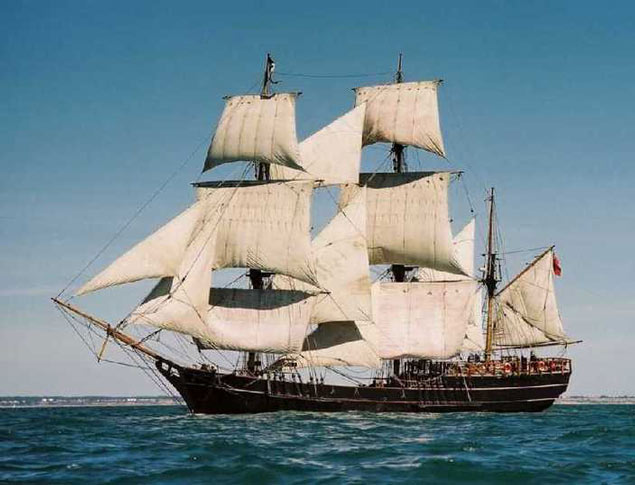 The Earl of Pembroke sets a brigantine rig.
The Earl of Pembroke sets a brigantine rig.
Dublin Port Company today announced the launch of Dublin Port Riverfest 2016. Now in its fourth year, Riverfest is Ireland’s premier sailing and maritime festival and a highlight of the city’s June bank holiday weekend calendar.
Taking place on North Wall Quay between the Samuel Beckett Bridge and the 3Arena from June 4-6, Riverfest features an array of maritime inspired entertainment and activities for all the family. The festival is expected to attract an estimated 65,000 visitors over the three days, providing a €1m boost to the local economy.
Visitors will experience a variety of activities and attractions, both on and off the water. Six tall ships and four schooners will open for the public to visit free of charge. Wakeboarding demonstrations, free tours of the Jeanie Johnston Ship, tug boat “dances” and river kayaking, as well as pirate themed activities, sniffer dog demonstrations, fun fair attractions and a food and craft fair will all contribute to the carnival on the quayside.
This year, there will also be a Liverpudlian presence at Dublin Port Riverfest, and an Irish presence at Liverpool’s Riverfest in the spirit of a new partnership being developed between the two port cities.
Three Cruise Ships Arrive at Riverfest
Bringing a further international dimension to the event, three major cruise ships will arrive at Dublin Port on the first day of the festival. The Boudicca, Le Boreal and Caribbean Princess all arrive on Saturday, June 4, bringing an additional 6,500 overseas visitors to sample the festivities during their stay.
Major Programme of Events
Riverfest is the culmination of a major programme of conferences and events for Dublin Port this week. The Cruise Europe Conference kicks off today (May 31 – June 2) at The Gibson Hotel in conjunction with Dublin City Council. Over 200 delegates will attend from leading cruise destinations across Europe, including all the major cruise lines and service suppliers to the cruise industry worldwide. This is the first time for the event to take place in Dublin, providing an opportunity to showcase the city as a leading cruise tourism destination.
Later this week Dublin Port will also host the European Sea Ports (ESPO) Annual Conference (June 2-3) at Dublin Castle. Attracting a further 300 delegates, this year’s conference will focus on ways to improve the efficiency of maritime transport and ports. In closing the event, EU policy makers will present their views on the issues raised and enter into a final debate with attending port authorities, while American economist Jeremy Rifkin will give a keynote address on the theme of “A Third Industrial Revolution and a Zero Marginal Cost Society.”
Delegates of both events will attend The Admiral’s Ball, a gala evening celebrating the Lord Mayor of Dublin’s honorary Admiralty of Dublin Port on the eve before Dublin Port Riverfest opens.
Eamonn O’Reilly, Chief Executive of Dublin Port said; “I’m delighted to see Riverfest in its fourth year and growing from strength to strength. The festival promises something for absolutely everyone to enjoy. Set against the backdrop of the River Liffey, the Samuel Beckett Bridge and North Wall Quay, Riverfest is a uniquely Dublin experience. The sight of tall ships and schooners on the quayside is always welcome and provides a beautiful reminder of the heritage and history of Dublin Port. I would encourage everyone in the city and from further afield to come along and enjoy the spectacle and fun of Riverfest this year.
I am delighted to say that many of the delegates attending both the Cruise Europe Conference and the ESPO Conference will be part of this year’s festivities. It’s a special opportunity for Dublin Port to host both events and we look forward to providing our international guests with an exceptional experience of Dublin as a vibrant port city with a bright future ahead.”
101 Year Old Gaffer Set to Return to Ringsend Roots
#DublinRiverfest- The 101 year old cruising yawl Ainmara is among the many participating vessels to celebrate the Golden Jubilee of the Old Gaffers Association (OGA) at the Dublin Port 'Riverfest' this Bank Holiday Weekend (1-3 June), writes Jehan Ashmore.
The 36ft Ainmara, is to make her centennial return to the River Liffey having been built downriver in Ringsend just over a century ago in 1912. She is owned by the noted Strangford Lough sailor, Dickie Gomes who has spent nearly three decades on her restoration.
So what is a gaffer?... it is a nautical terminology for a boat that has a main sail with 4 sides rather than the typical triangle you see commonplace on modern yachts.
The gaff is the wooden pole across the top of the sail, which is a pretty old type of rig, however by the early 20th century it was largely replaced by the triangular Bermudan rig, which was thought more efficient. As for lovers of gaff-rigged craft, the OGA still think gaff is best!...
Ainmara is part of a visiting fleet of OGA gaffers currently at sea, some of whom will be heading this way to compete in the Dublin Bay events over the course of the weekend.
The flotilla will take part in the annual Traditional Sailing Boat Rally of the Dublin Branch of the OGA to be held at Poolbeg Boat and Yacht Club & Marina in Ringsend over the long week-end.
Not to be missed is the highlight of OGA 'Parade of Sail' 50th anniversary celebrations this Sunday 2 June (starting at 4pm), where the largest gathering ever of East coast gaffers and from the UK will meet in the confines of the Liffey. According to the festival programme the flotilla of tallships which are due to arrive from today will also be involved.
Such a setting presents both action and colour on the river as the Old Gaffers are to form a striking contrast against the modern backdrop of the Samuel Beckett swing-bridge with its sail-like harp-strung construction.



























